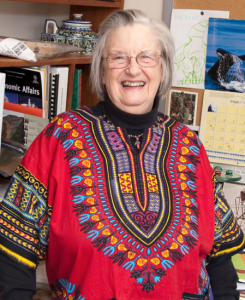Support us from £3/month
We deal with almost 1000 cases a year assisting communities, groups and individuals in protecting their local spaces and paths in all parts of England and Wales. Can you help us by joining as a member?
We are deeply saddened at the death of international commons champion and Nobel prizewinner Elinor (Lin) Ostrom on 12 June.
Lin was the first and only woman to win the Nobel prize for economics. This was in 2009 for her ground-breaking work on commons. She challenged the popular notion, ‘Tragedy of the commons’, that depletion of shared resources is inevitable, and she demonstrated that common property is often best managed by users of that property, who create and enforce measures to prevent over-exploitation.
Lin was the co-founder and senior research director of the Workshop in Political Theory and Policy Analysis at Indiana University in Bloomington, USA and founding president of the International Association for the Study of the Commons (IASC).
Says Susan Buck, president of the IASC and Associate Professor of Political Science at the University of North Carolina:
‘On June 12, Nobel Laureate Elinor Ostrom died aged 78 and the commons lost a great champion. Because of her work, especially Governing the Commons, we know that the tragedy of the commons is not inevitable and that people can and often do work co-operatively to achieve sustainable commons. She fused economic theory with practical application; she “ground-truthed” everything, so her work is a rich source of commons cases.
‘Lin was warm and generous. As one of the founders of the IASC and our first president, she was a constant support and inspiration as well as a great friend to campaigners for the commons worldwide.’
Adds Kate Ashbrook, general secretary of the Open Spaces Society: ‘The commons movement owes Lin a huge debt of gratitude for putting us so firmly on the global map. Her scholarly work on commons issues, in the widest context, shows just how crucial commons are to the survival of our species. Her work demonstrates how, here in England and Wales, commons are still highly relevant today. They provide huge public benefit—for wildlife, landscape, archaeology, culture and recreation—which often goes unrecognised.
‘As the oldest organisation campaigning for commons, the Open Spaces Society salutes all that Lin achieved and remembers her with great affection.’
Read Lin Ostrom’s obituary in The Guardian here.

